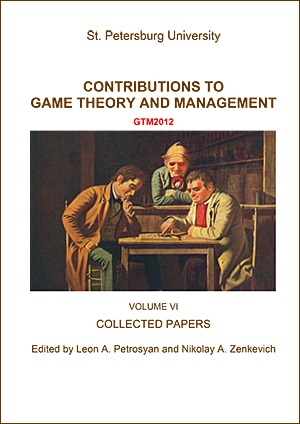A Survey on Discrete Bidding Games with Asymmetric Information
Abstract
Repeated bidding games were introduced by De Meyer and Saley (2002) to analyze the evolution of the price system at finance markets with asymmetric information. In the paper of De Meyer and Saley arbitrary bids are allowed. It is more realistic to assume that players may assign only discrete bids proportional to a minimal currency unit. This paper represents a survey of author's results on discrete bidding games with asymmetric information.
Keywords:
multistage bidding, asymmetric information, price fluctuation, random walk, repeated game, optimal strategy
Downloads
References
Aumann, R. and M. Maschler (1995). Repeated Games with Incomplete Information. The MIT Press: Cambridge, Massachusetts - London, England.
De Meyer, B. (2010). Price dynamics on a stock market with asymmetric information. Games and Economic Behavior, 69(1), 42–71.
De Meyer, B. and A. Marino (2005). Continuous versus discrete market game. Cowles Foundation Discussion Paper , No 1535.
De Meyer, B. and H. Saley (2002). On the Strategic Origin of Brownian Motion in Finance. Int. J. of Game Theory, 31, 285–319.
Domansky, V. (2007) Repeated games with asymmetric information and random price fluctuations at finance markets. Int. J. of Game Theory, 36(2), 241–257.
Domansky, V. (2013). Symmetric representations of bivariate distributions. Statistics and Probability Letters, 83, 1054–1061.
Domansky, V. and V. Kreps (2005). Repeated games with asymmetric information and random price fluctuations at finance markets. Proceedings of applied and industrial mathematics, 12(4), 950–952 (in Russian).
Domansky, V. and V. Kreps (2009). Repeated games with asymmetric information and random price fluctuations at finance markets: the case of countable state space. Centre d'Economie de la Sorbonne. Preprint 2009.40, Univ. Paris 1.
Domansky, V. and V. Kreps. Repeated games with asymmetric information modeling financial markets with two risky assets submitted to RAIRO
Gensbittel, F. (2010). Asymptotic analysis of repeated games with incomplete information. Th`ese de doctorat de l’Universit´e Paris 1, Panth´eon-Sorbonne-Paris (10/12/2010), Bernard De Meyer (Dir). http:/tel.archives-ouvertes.fr/tel-00579522/fr/ .
Kreps, V. (2009). Repeated Games Simulating Exchange Auctions and Return Sequences. Journal of Computer and Systems Sciences International, 48(4), 604–615.
Obloj, J. (2004). The Skorokhod embedding problem and its offspring. Probability Surveys, 1, 321–392.
Sandomirskaia, M., Domansky, V. (2012). Solution for one-stage bidding game with incomplete information. Int. Conf. Game Theory and Management GTM2011. Collected Papers. Eds. by L. Petrosjan and N. Zenkevich. 268–285.
Sandomirskaia, M. (2012). Game-theoretic approach to insider trading modeling: one-stage bidding with non-zero bid-ask spread. Int. Conf. Game Theory and Management GTM2012. Abstracts. Eds. by L. Petrosjan and N. Zenkevich. 232–233.
Sandomirskaia, M. (2013 a). Game-theoretical modelling of stock market dynamics: trading mechanism with non-zero bid-ask spread. Journal of New Mathematical Association (submitted to).
Downloads
Published
How to Cite
Issue
Section
License
Articles of "Contributions to Game Theory and Management" are open access distributed under the terms of the License Agreement with Saint Petersburg State University, which permits to the authors unrestricted distribution and self-archiving free of charge.




